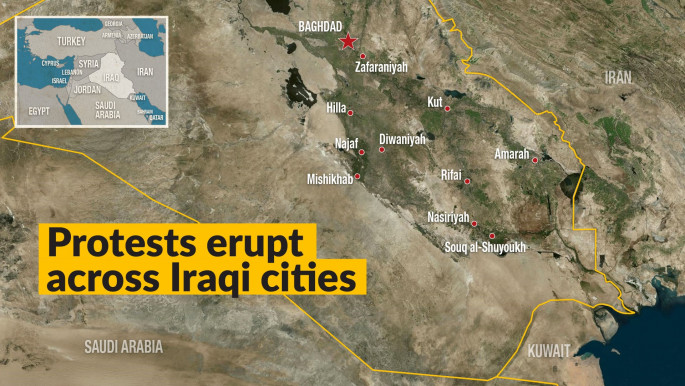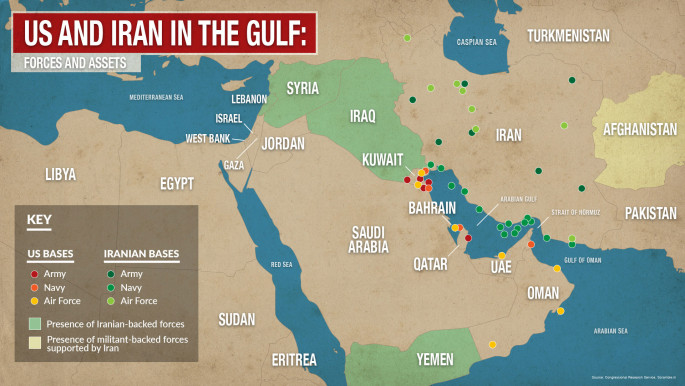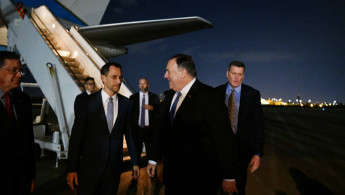US State Department planning to dramatically scale down diplomatic presence in Iraq
The US State Department is planning to drastically reduce the number of diplomats stationed in Iraq, despite President Donald Trump's stated goals of countering Iranian influence in the region.
The State Department sent plans to the Senate Foreign Relations Committee this month to reduce the number of staff by almost 30 percent, Foreign Policy revealed Tuesday.
The US mission in Iraq will see the number of employees at its embassy, diplomatic support centre, and consulate in Erbil reduced from 486 to 349 by the end of May, the documents seen by FP detailed.
Fifteen years on from when it first intervened military in the country, the US currently has around 6,000 troops in Iraq.
Cuts to the American embassy in Iraq would come at a time of serious upheaval in Iraq, with anti-government protests and seemingly growing Iranian influence gripping the country.
The State Department said in its document that reduced staffing levels "will allow Mission Iraq to still achieve its core objectives, and conduct adequate monitoring and oversight of programs".
But critics see the reduction as a threat to US interests in the region.
"The administration apparently thinks that we can manage the volatile situation in Iraq with a skeleton crew of diplomats," Senator and member of the Senate Foreign Relations Committee Chris Murphy told FP.
 |
| Read more: Iraq's lost generation |
"It may not be a coincidence that Iraq has unraveled since we started to draw down our presence at the embassy, and we need to find a way to reverse course - fast. If we don't, I fear Iraq will continue to slide into crisis without a political solution and we will be in a worse-off position to defend our national security interests."
All non-emergency US staff in Iraq were ordered to withdraw by Pompeo in May due to unspecified Iranian threats and Foreign Policy's report indicates this move will become permanent.
"Ensuring the safety of US government personnel and US citizens abroad is our highest priority. Our embassy in Baghdad and our Consulate in Erbil are open for business, and Ambassador [Matthew] Tueller and his team are on the ground engaging daily," a State Department told FP.
Also on Tuesday, Washington called on Baghdad to "take actions" to protect US interests in the country, after a flurry of attacks that have been blamed on Iranian-backed groups. Tehran wields growing influence in Iraq, particularly through armed factions.
Since 28 October, ten rocket attacks have targeted areas where US soldiers and diplomats are stationed.
They have not been claimed, but the US has blamed Iranian-backed Shia paramilitary groups.
'Unilateral decisions'
US Defense Secretary Mark Esper told reporters Monday he had expressed "concern about the optics in attacks on bases in Iraq where US troops and material might be," in a call with outgoing Prime Minister Adel Abdel Mahdi.
The US has "a right of self defense, that we would ask our Iraqi partners to take proactive actions... to get that under control, because it's not good for anybody," he told Abdel Mahdi.
Abdel Mahdi's office released a statement earlier Monday confirming the phone call and asking everyone "to spare no effort to prevent an escalation that will threaten all parties".
 |
"Unilateral decisions will trigger negative reactions that will make it more difficult to control the situation and will threaten Iraq's security, sovereignty and independence," he said.
Esper, speaking on a plane returning from Belgium, where he had attended the 75th anniversary of the Battle of the Bulge, acknowledged Tehran's involvement was difficult to prove.
"My suspicion would be that Iran is behind these attacks, much like they are behind a lot of malign behavior throughout the region," he said. "But it's hard to pin down."
Iranian influence
Abdel Mahdi is a close ally of Iran who also enjoyed cordial relations with the US. He resigned in early December after the two months of unprecedented demonstrations in the capital and Shia majority south that have left 460 people dead. Negotiations are underway to name his successor.
"If the Iraqi government or state weakens, this will exacerbate escalation and chaos," Abdel Mahdi told Esper, according to the statement.
Iran has gained overwhelming influence in Iraq since the 2003 US invasion brought down Saddam Hussein.
A US source recently told AFP that pro-Iran factions in Iraq were now considered a more significant threat to American soldiers than the Islamic State group (IS).
The attacks have killed one Iraqi soldier and left others wounded, as well as causing material damage in the vicinity of the US embassy in Baghdad's ultra-secure Green Zone.
Read more: Extreme inequality will fuel Middle East turmoil and uncertainty into the new year
The US has recently reinforced its security at the embassy, according to an Iraqi security source, who said "a convoy of 15 American vehicles each transporting armoured trucks and weapons entered the Green Zone".
Top US diplomat Mike Pompeo on Friday warned Iran's leaders "that any attacks by them, or their proxies of any identity, that harm Americans, our allies or our interests will be answered with a decisive US response".
US officials say they are considering sending 5,000 to 7,000 troops to the region to counter Iran, although Esper on Friday again denied a report that a 14,000-strong deployment was under discussion.
Follow us on Twitter and Instagram to stay connected





 Follow the Middle East's top stories in English at The New Arab on Google News
Follow the Middle East's top stories in English at The New Arab on Google News
![Israeli forces ordered bombed Gaza's Jabalia, ordering residents to leave [Getty]](/sites/default/files/styles/image_330x185/public/2176418030.jpeg?h=a5f2f23a&itok=_YGZaP1z)

